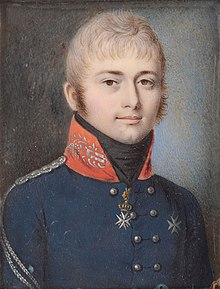Peter Petrovich Dolgorukov
Prince Peter Petrovich Dolgorukov , "the younger" (* December 30, 1777 - December 20, 1806 ), also Pyotr Petrovich Dolgorukij, was a Russian officer and diplomat from the Russian noble family of Dolgorukov . He was the second son of the Russian general Peter Petrovich Dolgorukov, the elder (1744-1815) and brother of the general Mikhail Petrovich Dolgorukov (1780-1808).
At the age of three months, his father enrolled him in the Izmailovsk regiment of the imperial bodyguard in 1778, and in 1792 he was listed as a captain. As a major he came to Moscow in 1793 and served as an adjutant to his uncle Juri (Georg) Vladimirovich Dolgorukov (1740-1830). At the age of barely 20, Peter became a colonel in 1797. He owed his close friendship with the Crown Prince Alexander of the same age in 1798 to be promoted to major general and appointed military governor of Smolensk . Since 1799 Tsar Paul's adjutant general , he was allegedly one of those conspirators who murdered him and was taken over by Paul's successor Alexander in 1801. He served the young tsar on diplomatic missions in 1802 and 1804 in Sweden and Prussia and accompanied Alexander to Berlin and Potsdam in 1805 .
In Alexander's environment, the brothers Peter and Mikhail Dolgorukov belonged to the so-called "war party" who urged the tsar to form a coalition with the Austrian Empire and to go to war against France , although - according to the Russian historian Eugen Tarlé - they were militarily "absolute zeros". On the eve of the Battle of Austerlitz , Peter was sent to negotiate with the French Emperor Napoleon, to whom he arrogantly submitted demands that were unacceptable to France. Arrogant and inexperienced, he was deceived by Napoleon, who pretended to be battered and distraught, in order to induce the Russians to rush to attack. Napoleon is said to have amused himself for years at Prince Dolgorukov's stupidity and referred to him in his memoirs as "freluquet" (in German, for example: snooty Laffe, Fant, Fatzke).
After the Russo-Austrian defeat he was sent to Prussia as a special envoy, then sent to the war against the Ottoman Empire in 1806 and finally ordered back to Petersburg during the Prussian-Russian war against France and assigned to the army operating in Poland. However, he fell ill on his return journey from the Ottoman front and died on his arrival in St. Petersburg despite the efforts of the court doctors.
literature
- Eugen Tarlé : Napoleon , page 209 and 211. Rütten & Loening, Berlin 1963
- Alexander Mikaberidze: Russian Officer Corps of the Revolutionary and Napoleonic Wars 1795-1815 , p. 80.Savas Beatie, New York 2005
| personal data | |
|---|---|
| SURNAME | Dolgorukov, Peter Petrovich |
| ALTERNATIVE NAMES | Dolgoruky, Pyotr Petrovich |
| BRIEF DESCRIPTION | Russian general and diplomat |
| DATE OF BIRTH | December 30, 1777 |
| DATE OF DEATH | December 20, 1806 |
